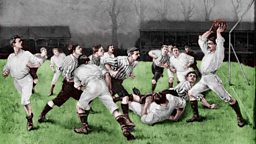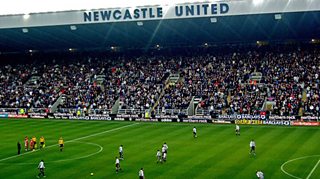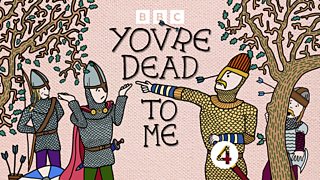The surprising origins of football club names
We tend to take the names of football clubs for granted – the Uniteds and the Wanderers, even the Wednesday of Sheffield Wednesday and the Villa of Aston Villa. These are household names now but they each have a rich history behind them.
In Word of Mouth, the podcast about language, presenter Michael Rosen and football journalist Dominic Fifield explore when football was just kicking off and finding its feet to uncover some of the history behind club names.
Here are seven things we learned...

A lot of football clubs started out as cricket clubs!
Football teams including Tottenham Hotspur, Aston Villa and Sheffield Wednesday all started out as cricket clubs.

The Hotspur Cricket Club, founded in 1880, was comprised of a group of schoolboys who played on Northumberland Park in North London. The park was named after the fourteenth century Duke of Northumberland, Henry Percy, who was nicknamed Harry Hotspur by his enemies (and namechecked in Shakespeare). The players wanted to keep active in the winter and so founded Tottenham Hotspur Football Club (also known as Spurs) two years later.
Meanwhile, Sheffield Wednesday originated in 1820 when six local tradesmen who worked a half-day on Wednesdays formed the Wednesday Cricket Club. There were cricket clubs on all of the other weekdays too, so it could have been Sheffield Tuesday! The football club was established in 1867 but the name Sheffield Wednesday, however, wasn’t adopted until 1929.
There was often a connection between football and the Bible
Aston Villa was established in 1874 when members of the Bible reading club at the Aston Villa Wesleyan Chapel formed a cricket club and then, later, a football club.
Bolton Wanderers were also born from a Bible class. In 1874, a football team called Christ Church F.C. was set up by Anglican priest the Reverend Joseph Wright, the Wanderers element of the name came when, according to Dominic, Wright’s congregation “grew tired of his authoritarian approach to life and wandered off in search of a new headquarters and a new club. And so what was Christ Church F.C. became Bolton Wanderers F.C.”
There was no such thing as a home ground for some clubs
"Wanderers" were typically nomadic football clubs.
Other than Bolton Wanderers, clubs with nomadic histories included, of course, Wolverhampton Wanderers, which was formed from two teams - Saint Luke's and the Black and Hall Wanderers – both of whom had no home ground for a while. Meanwhile Wickham Wanderers were so named after being inspired by a semi-permanently nomadic team called The Wanderers F.C. The Wanderers started out as Forest F.C. in Leytonstone, near Epping Forest, before moving to Kennington Oval. They played over 150 games in Kennington but were still itinerant and were known as ‘The Travelling Gentlemen,' whose motto, says Dominic, was “playing for pleasure rather than reward.”

Industrial workplaces were also a key birthplace for football
Many of the football clubs who ended up forming or joining the Football League were born out of groups attached to workplaces. Arsenal was one such example. The club started out as munitions workers from the Woolwich Arsenal playing recreationally and who were known as ‘Dial Square F.C.’ because there was a sun dial outside their workshops. As football teams and competitions grew in number, they renamed themselves ‘Royal Arsenal’ – with the Royal coming from the Royal Oak pub in Woolwich where the players met. Founded in 1886, the team went professional in 1893, changing their name again to ‘Woolwich Arsenal’ before moving to Highbury, North London, in 1913 and dropping the Woolwich part of their name.
Uniteds were often marriage of convenience
The merging of two or more clubs was, as Dominic notes “very, very common in the Victorian era.” Mergers often took place to wipe away debt or if a club wanted to “up their game and turn professional.”

Newcastle United started out as two clubs, Newcastle West End and Newcastle East End. Newcastle West End had run into difficulty but had St James’ Park as their home ground. Newcastle East End decided to take over the lease of the ground and the players from West End and reform the club as one.
Rotherham was another merger example, as was Leeds United who started out as Leeds City but hit difficulty when they were accused of making illegal payments during the First World War. They were wound up and auctioned off, but a group of fans organised and set up a new club – Leeds United – with the name reflecting their opposition to the injustice they felt had been done to the original club.
Wimbledon gave us the craziest rebranding story

One of the most famous stories of identity in football was what happened with Wimbledon F.C. Known as ‘The Crazy Gang’ in the late 1980s and in the 1990s, Wimbledon had achieved the “impossible” and journeyed their way to the First Division from Non-League status and picked up an FA Cup win too. After 14 years in the top flight, they were relegated from the First Division in 2000. The owners decided to move to Milton Keynes, later rebranding the team to MK Dons. Meanwhile, AFC Wimbledon had been founded by fans disillusioned by this decision and the club proceeded to go on a similar journey to their forebears, rising through non-League divisions and entering the Football League again and even returning to their original ground, Plough Lane.
Doncaster Belles
Founded in 1969, one of the most celebrated Women’s football teams is the Doncaster Belles, who Dominic describes as “the pre-eminent force in women's football in this country up to the mid-nineties.” The team originally played at Doncaster Rovers' own ground called Belle Vue. But Dominic believes that the meaning of ‘belle’ as ‘beautiful lady’ explains the pluralisation.
Find out the stories behind Port Vale, Accrington Stanley, West Bromwich Albion and Crystal Palace, among others, by listening to Word of Mouth: Football Club Names
Dominic Fifield writes for the website, The Athletic, and previously for The Guardian.
More from 大象传媒 Radio 4
-
![]()
You're Dead To Me: The History of Football
Greg Jenner and his guests discover the history of the beautiful game.
-
![]()
10 things we learned about words associated with women
The etymology of many women's words tells a nuanced story of shifting attitudes.
-
![]()
One man鈥檚 inspirational journey in overcoming a stammer
A man who could not form a full sentence is now a stammer campaigner on the world stage.
-
![]()
Exclamation Marks!! Why do we love to hate them?
How this mark at the end of a sentence can flag up surprise, wonder, irony and more.




